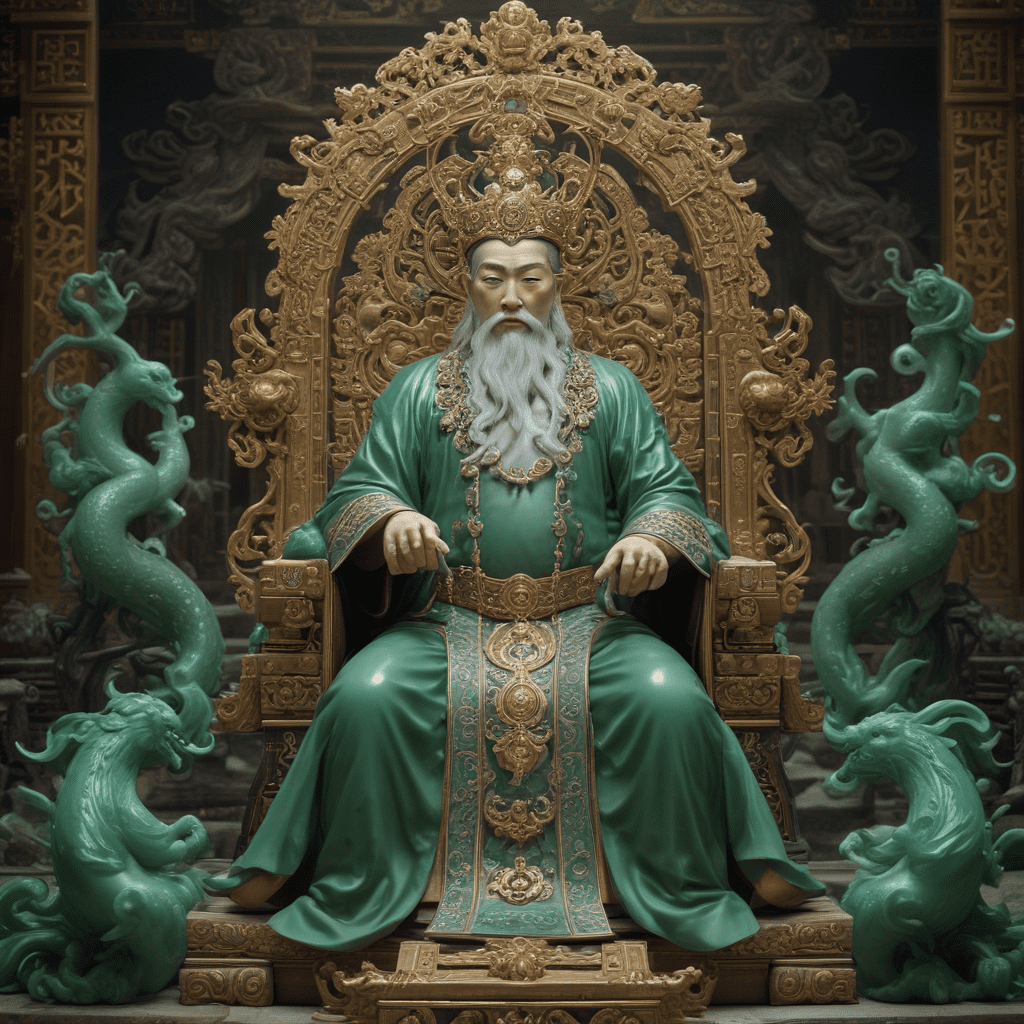The Myth of the Jade Emperor in Chinese Mythology
1. Introduction
In the vast pantheon of Chinese mythology, the Jade Emperor occupies a towering position as the supreme ruler of the heavens. His legend has captivated generations of Chinese storytellers, artists, and philosophers. This article delves into the fascinating myth of the Jade Emperor, exploring his origins, powers, and profound influence on Chinese culture.
2. Origins and Description of the Jade Emperor
According to Taoist tradition, the Jade Emperor emerged from the primordial chaos as a divine being of immense power. He is depicted as a majestic figure with an ornate jade crown and flowing robes, representing his celestial authority. His facial expression is often serene, reflecting his wisdom and compassion.
3. The Heavenly Court and the Three Realms
The Jade Emperor resides in the Heavenly Court, a celestial palace that floats amidst the clouds. He governs the Three Realms: the Heaven, the Earth, and the Underworld. Each realm has its own celestial hierarchy and officials, who carry out the Jade Emperor's edicts and maintain cosmic order.
4. The Jade Emperor's Power and Authority
As the supreme ruler of the heavens, the Jade Emperor possesses immense power. He can control the weather, summon deities, and punish or reward mortals. He also oversees the reincarnation of souls, determining their fate in the afterlife. His authority extends to all aspects of the universe, making him the ultimate judge and arbiter of cosmic balance.
5. The Jade Emperor in Folklore and Legends
The Jade Emperor is a central figure in numerous Chinese folktales and legends. These stories often depict him as a benevolent ruler who intervenes in human affairs to help the virtuous and punish the wicked. He is also associated with the celebration of Chinese New Year, which is believed to mark his birthday or the beginning of his reign.
6. The Worship and Significance of the Jade Emperor
The Jade Emperor is a highly revered deity in Chinese culture. Temples and shrines dedicated to him can be found throughout China, and his image is commonly featured in religious ceremonies and celebrations. Devotees pray to the Jade Emperor for blessings, protection, and guidance. He is also considered the patron deity of the Chinese people, representing their national identity and cultural heritage.
7. The Jade Emperor in Chinese Art and Literature
The Jade Emperor has been a popular subject in Chinese art for centuries. Paintings, sculptures, and carvings depicting him adorn temples, palaces, and homes. In literature, he appears in numerous novels, plays, and poems, where he is often portrayed as a wise and benevolent ruler or a stern and impartial judge.
8. The Influence of the Jade Emperor on Chinese Culture
The myth of the Jade Emperor has profoundly influenced Chinese culture. His teachings on morality, justice, and cosmic order have shaped Chinese thought and behavior for millennia. He has also been an important figure in Chinese politics, with emperors and rulers claiming to derive their authority from him.
9. Modern Interpretations and Adaptations of the Myth
In recent times, the myth of the Jade Emperor has been reinterpreted and adapted in popular culture. Films, television shows, and video games have featured characters inspired by or directly portraying the Jade Emperor. These modern adaptations have introduced the myth to new audiences and continue to keep the legend alive in the 21st century.
10. Conclusion
The myth of the Jade Emperor is a testament to the rich imagination and profound spirituality of the Chinese people. Through centuries of storytelling, artistic representation, and religious devotion, the Jade Emperor has become an iconic figure that embodies the Chinese cultural ethos of harmony, balance, and the pursuit of a just and orderly society.
FAQ
Q: Is the Jade Emperor a real historical figure?
A: No, the Jade Emperor is a mythological figure originating from Taoist beliefs and Chinese folklore.
Q: What is the purpose of worshipping the Jade Emperor?
A: Devotees pray to the Jade Emperor for blessings, protection, guidance, and to express their gratitude for his benevolence.
Q: Where can I find temples or shrines dedicated to the Jade Emperor?
A: Temples and shrines dedicated to the Jade Emperor can be found throughout China, especially in major cities and religious centers.
Q: Has the myth of the Jade Emperor influenced modern Chinese culture?
A: Yes, the myth of the Jade Emperor continues to influence modern Chinese culture through its presence in art, literature, and popular media.




